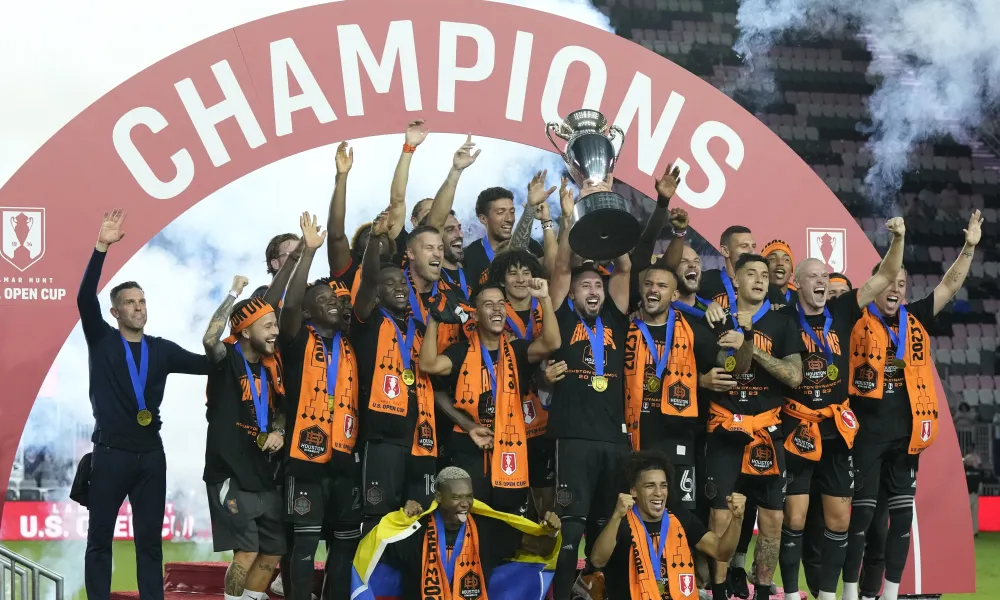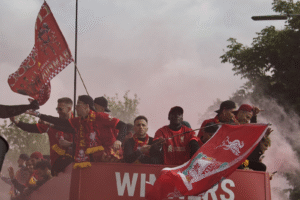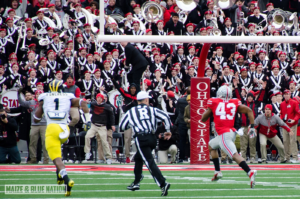There have been multiple times on this blog where I’ve mentioned that I really don’t care for MLS, nor do I watch much MLS. Sure, I’ll wake up at 6:30 to watch Liverpool tie with Burnley (I wrote this before Liverpool won today; I will sit in my shame). But, for some reason, I just can’t get into MLS. Maybe it’s because when contrasted with its European counterparts, there’s something missing. There’s something just special about watching a club founded in the 1800s steep itself in all those little moments. And, well, MLS doesn’t really have that. It makes sense, but it can be a turn off.
Of course, there are rabid fans who work hard to create those traditions. Look at teams in the Northwest; men and womens teams forcibly pull new tradition to make the clubs feel old. But it’s competing with an American sports mentality where owners control all, and can rip the history of a team and town with one financially-motivated move (see the Oilers). That’s why, when MLS announced it wanted to pull its first teams out of the longest-reigning tradition in the US, it only added to MLS’ lack of tradition.
And this goes deeper than just to American soccer. American sports is foregoing its long-held traditions at the behest of billionaire owners who have one goal in mind: grow the wealth of the game.
MLS and the Open Ladder
The US Open Cup is the purest form of soccer in this country. Throughout the world, soccer is dominated by promotion/relegation. Given how sports have been set up in America, the MLS was never going to allow that option. So the landscape of soccer in America is some weird amalgamation of a pyramid with MLS at top, scheming desperately to withhold all the resources. Which is why, when MLS pulled its first teams out of the US Open Cup, it wasn’t that surprising. Especially in a year where a USL team beat its champions.

There are a slew of reasons that the MLS decided to make this decision. MLS is unlike other soccer leagues in the world, because it also lives in the American, corporatized sports behemoth. I’m not going to sit here and pretend like other leagues around the world don’t operate as moneymaking ventures (Barcelona is actively trying to pay a player less), but the American sports business operates on the same level as a caricature of Gordon Gecko. So, when the MLS can’t control the broadcast rights, or really anything else about the tournament, the owners are going to be a little annoyed. Because, unlike the NFL or the NBA where the commissioner has to keep the owners happy, US Soccer operates as an overarching, national entity, that has more interests in mind than just the professional teams. So, if US Soccer makes a decision that the owners don’t like, those same MLS owners can’t Jerry Jones-strongarm their way into getting what they want.
The last line of defense here is US Soccer. US Soccer very smartly realizes that soccer in the US is at a sport-defining impasse. Not only was the last World Cup great for growing the American game and the Messi effect is in full swing, the World Cup will be here in 2026. US Soccer couldn’t allow MLS to swing its metaphorical soccer balls all over one of the only long-term traditions. And, with that, it couldn’t allow MLS to
The whole point of the competition is that everyone is involved – or at least everyone who signs up. Of course, for a competition which potentially includes all the soccer teams in the United States, it doesn’t make sense for the largest league to exclude itself. Unless the tradition itself doesn’t matter. Because for years the MLS has complained of low numbers – both in ticket sales and viewership – for the US Open. Which makes sense, because no one really cares if the Galaxy are playing a team from Santa Clara. The only people who care are from that team in Santa Clara and the handful of fans.
Every major soccer team worldwide participates in its country’s tournament. If the Premier League, or even a single Premier League team, tried to pull out of the FA Cup and cited “fixture congestion” I think the FA itself would burn the club to the ground. Just like US Soccer, the FA (Football Association) has more interests than just the Premier League. The decision-making process does not function within the top-league-vacuum like other American leagues. US Soccer has to think
And whenever a Premier League team shows up to play a League 2 team, the fans show up. Crazy enough, whenever an MLS team comes to play a much smaller club, the fans show up. Sure, Messi can do it at Camp Nou, but has he ever done it in Pensacola on a Wednesday night? Part of me thinks he couldn’t. To be fair, there is zero way Inter Miami would play him. But that’s not the point. It’s about creating a ladder for soccer to grow in the country without the sole focus on big cities with aging star players. The MLS is integral in showing a town of 5,000 people why the big four sports aren’t the end all be all of sports.
Which is why MLS’ decision is tinged with American sports corporate greed. And is why US Soccer could not acquiesce. MLS has been around since the 90s, while this competition has been around since before WW1. As with every other soccer pyramid, the top league is not an ivory tower; it is part of the same chaotic ladder.
College Sports and Tradition Degradation
Earlier in the year, when there were rumors Gonzaga was going to join the Big 12, I wrote a blog about how much I hated the idea. There is something inherently special in watching teams play each other with geographic proximity and that local histroy. Back in the AAC, whenever UH played SMU, I knew I hated those fans. Most everyone in Texas knows that SMU graduate, and that person knows why SMU has the reputation it does. Rich snobs that are more interested in their next coke score than the fact their father is probably running an oligopoly they will one day inherit.
But this is becoming the larger context of college sports. And, I fear, sports as a whole. We have been given a front row seat the real time degradation of college tradition in favor of professionalization. MLS was just the one most willing to say out loud that they wanted to stay in their VIP room of professionalization. College sports is quickly following behind. I know the logic is somewhat flawed, but the fact that Arch Manning, who has basically been a glorified ball handler, will make more money than Brock Purdy is vaguely concerning. And with the money comes deescalation of tradition. I’m not saying tradition isn’t there at a professional level, but an owner/team will kill a tradition if the CFO says its a smart move. They know the fans will still show up.
Slowly but surely I am becoming fearful for March Madness. It’s genuinely one of the most perfect tournaments in the world. I would even argue it is the best sports tournament in the world. The World Cup doesn’t even have anything on a tournament, because it is so magical to watch 20-year-olds become the most important people in the world for 40 minutes. But, there is no way that isn’t going to change. Change is coming, and just like an unstoppable force, tradition is a very moveable object.
As conferences realign and we inch closer to a Pangean conference, tradition must die for progress. Or at least the progress for professionalization. The death of the Pac-12 was just the canary in the coal mine. And just like the MLS, tradition is only that at the end of the day.
Follow Moon Stamp Sports on Twitter/X and Instagram, and follow Jorden on Twitter/X.






Its good as your other blog posts : D, appreciate it for posting. “Too much sensibility creates unhappiness too much insensibility leads to crime.” by Charles Maurice de Talleyrand.